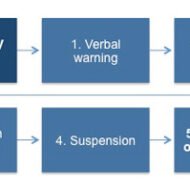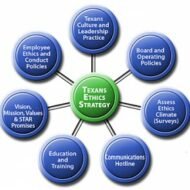Posted by Managementguru in Business Management, Change management, Human Resource, Organisational behaviour, Principles of Management
on Mar 20th, 2014 | 0 comments

Organizational Discipline – A Way of Life Organizational Discipline: Discipline is the force that prompts individuals or groups to observe rules, regulations, standards and procedures deemed necessary for an organization. Discipline is one word that instills fear in the minds of individuals. The very word sounds autocratic when uttered by your boss and creates a feeling that you are being forcibly controlled. If you do not live up to the expectations of the management, definitely you are going to get listed for disciplinary action. Why is that discipline always gets enforced to gain obedience?Why people get intimidated when subjected to disciplinary action?Why streamlining your behavior becomes so difficult some times? Have you ever given a thought on how we always try to put the blame on management for being a father figure? We have to see things from a broader perspective. When you work for somebody, it is their prerogative to develop some rules and standardize some norms which they think is suitable for the mode of operations. Policies and procedures are formulated for the effective functioning of the organization. It is your responsibility to make them satisfied with your conduct to gain trust and confidence. Organizations are real time schools where you can learn a lot about proper social behavior and develop high standards of discipline. Learning Induces Change in Behavior Learning, an ongoing process is a wonderful experience and individuals must use the opportunity to fit themselves well in the human network when they work for big corporates. The objective of discipline is “orderly behavior”. How many of you maintain a cordial relationship with your peers in the organization?Are you sure they are not talking behind your back for some unpleasant quality of yours?Are you alienating yourself from the rest of the group? Self appraisal is the best way to rank yourself against various critical factors of interpersonal relationship with your team members. Things which we have to consider that might be the causes for indiscipline and misconduct stems from psychological, social and personality oriented factors. Absenteeism Pic Source: Dominion Systems Absenteeism is one thing that no superior can withstand as it directly affects the productivity and vitality of the company. The reasons if presented are weird, he becomes more agitated. Dishonesty is not a thing to be tolerated by the management. Insubordination also causes clashes between the executives and the employees as their “egos are battered.” Carrot and Stick Policy Considering from the employees’ point of view, the carrot and stick policy of the management alone do not make them committed to the firm. Challenging tasks, sense of participation, favorable work climate etc. makes them more responsible and faithful. Immediate rewards and recognitions are more appealing than deferred benefits like pension or gratuity. The emotional aspects of the employees must not be handled in a conservative but in a flexible manner by the management. This will create a feeling of trust and openness between the two. Democracy Hard and fast rules may not solve the purpose when there is no room for any humanism or democracy. This might even be the cause for employees to work against the interests of the company. This leads to disciplinary actions which prove hectic to both the parties. The management on its part has to definitely shed its autocratic attitude and adapt to more participative style of leadership. Personnel department has to play their administrative role in acting as a link factor between the employees and their superiors. Although managers exercise the authority of punishment, it is the HR department’s duty to develop proper procedures of administration of discipline and assist the management in conducting enquiries and solicit the cooperation...

Posted by Managementguru in Business Ethics, Business Management, Entrepreneurship, Organisational behaviour, Principles of Management
on Mar 15th, 2014 | 0 comments

The Origin of Unethical Behavior Ethical considerations in business are important to managers as it is to individuals in their personal lives. Personal life and business life cannot be perfectly separated with respect to moral judgements. A number of factors have been established as significant in making ethical standards a primary concern of business managers. What are Values? For the individual, the job is the centre of life, and its value must be, in harmony with the rest of life, if he is to be a whole and healthy personality. In an industrial society. The values tend to become those of the entire corporate culture. The public is insisting that business leaders are, in fact, responsible for the general social welfare and that the manager’s responsibilities go far beyond those of running the business. Even if the manager insists on a narrow definition of his role as possible, it is, however, essential that he takes these intangibles into consideration since they are the real motivating force in an organization. Expectations of the Society: If an organization did not behave in accordance with the social systems and expectations, it may not merely lose its market share but face another piece of legislated control and might also lose its very right to exist. Many a times managers may be forced to compromise their personal ethics and moral values in order to achieve organizational goals. Everyday ethical decisions are usually made between the lesser of the two evils rather than obvious right and wrong. Often it may be difficult for the manager to free himself from taking a biased attitude and look at issues objectively. In spite of good intentions, he becomes involved in the situation and it becomes difficult to retreat and take a detached point of view in examining the issue from an ethical standpoint. In the light of these problems, certain examples can be cited to answer the question as to what constitutes unethical behavior. Padding expense accounts to obtain reimbursement for questionable business expense. Revealing confidential information of trade secrets. Giving or accepting gifts or favors. Using company property and/or materials for personal use. Leaving the job without abiding by the sales contract. Being severely critical of competitors. Attempting to corner opportunities by bribing public officials. Price discrimination, unfair trade practices, unfair pricing etc. , Dishonesty in fulfilling contracts. Politics inside the organization. Unless and until the professional manager puts the interest of the organization in front of his own, places the duty to the society above his duty to the organization wholeheartedly, there is no point in talking about ethics in theory. Though a number of firms spend their time, money and energy in formulating statements, in reality their enthusiasm is lost in practice. The gap between the espoused and practiced values creates a dissonance in the minds of the people, and as a result in the...




